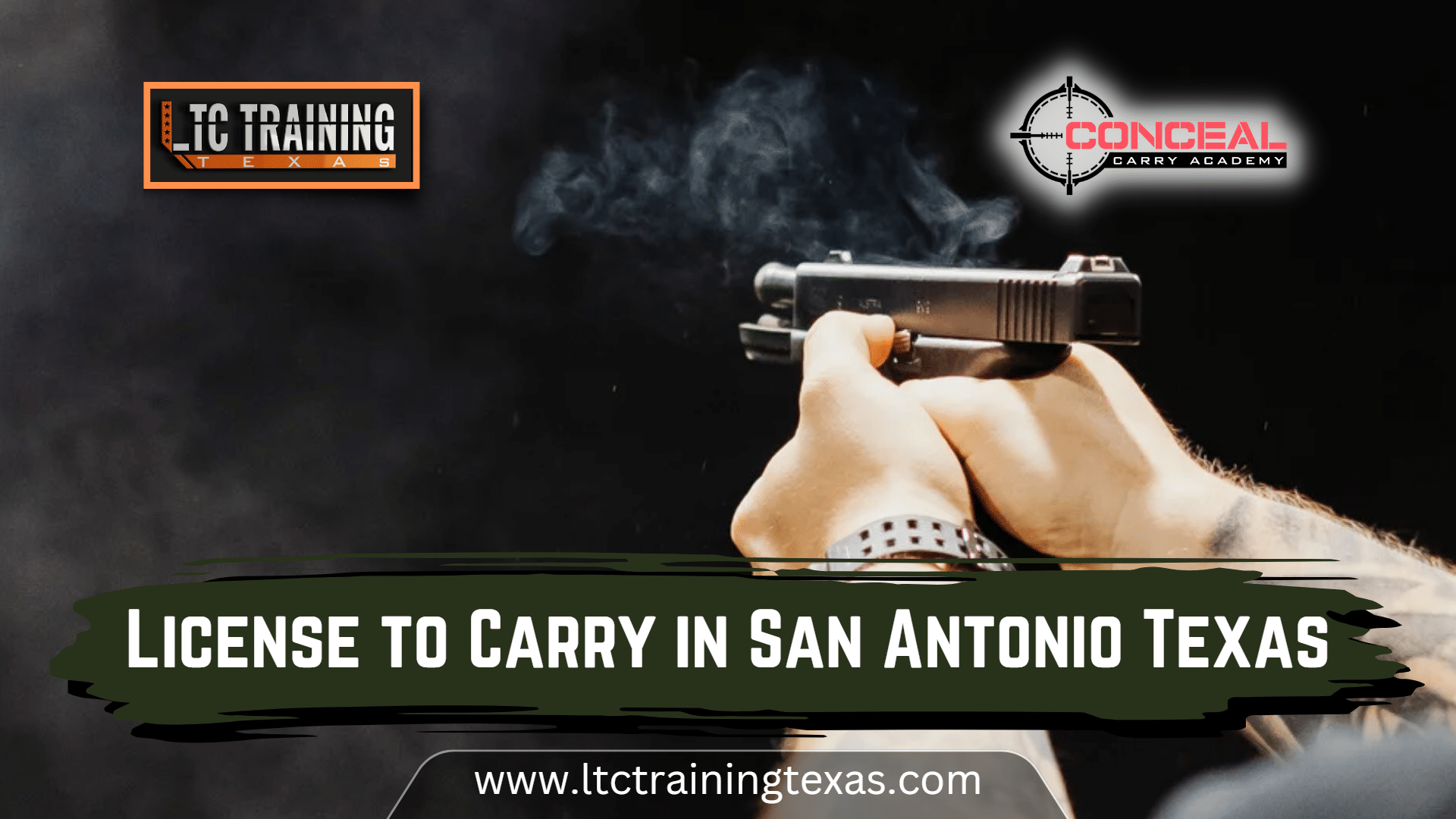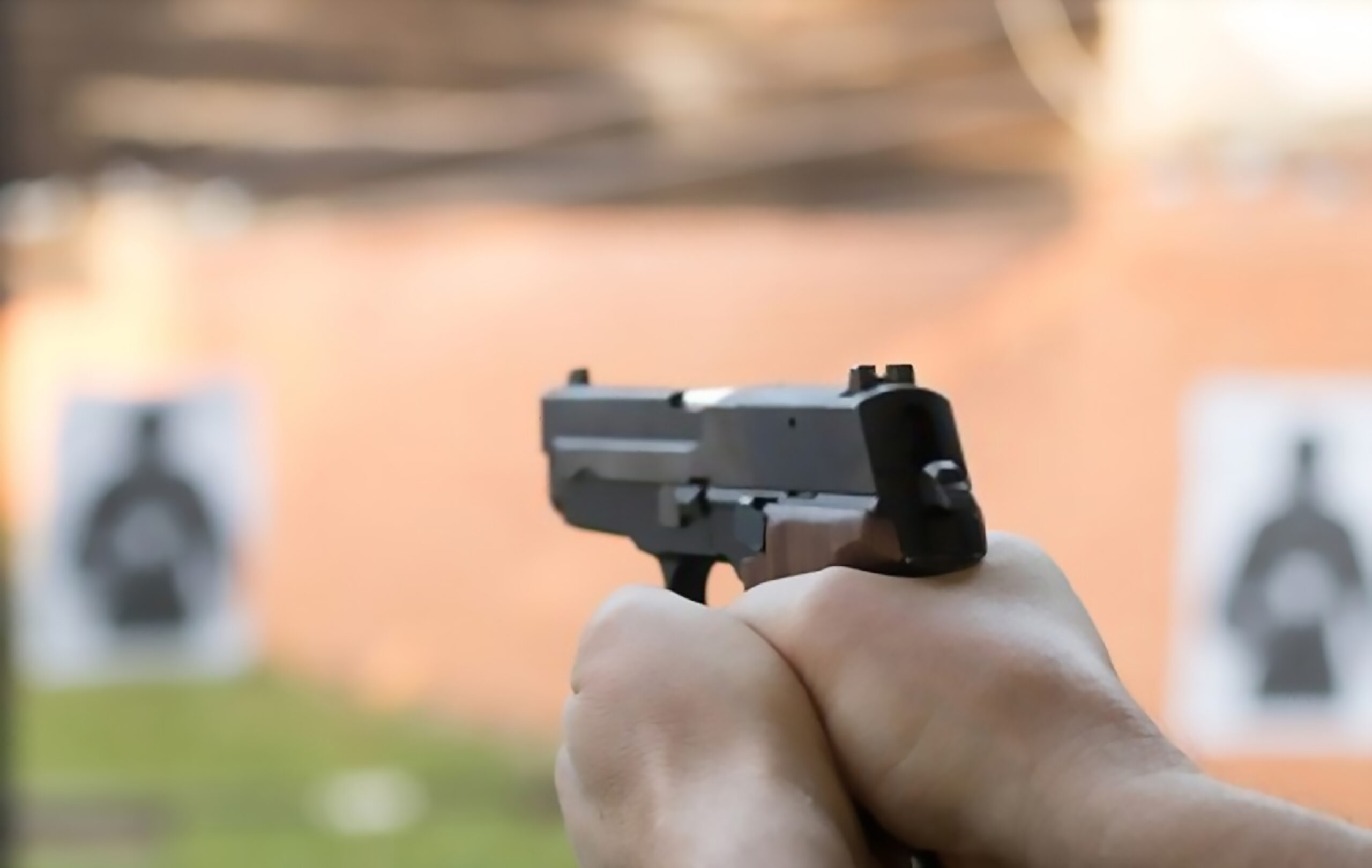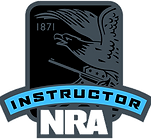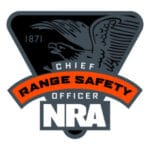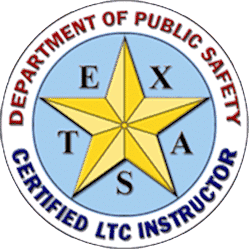License to Carry in San Antonio Texas: Your Comprehensive Guide to Concealed Carry
Concealed carry has become increasingly popular in San Antonio, Texas, as many residents choose to exercise their right to personal protection. While Texas has open carry laws, a License to Carry (LTC) offers several advantages and a smoother experience for lawful gun owners. This comprehensive guide provides all the information you need to navigate the LTC process in San Antonio, from understanding the benefits and eligibility requirements to choosing the right training course and navigating the application process.
In this in-depth guide, we’ll cover:
- What is a License to Carry?
- Advantages of an LTC over Open Carry in San Antonio
- Key Requirements for LTC Eligibility
- The Step-by-Step LTC Application Process
- Selecting a Quality LTC Training Course in San Antonio
- Associated Fees and Costs of a License to Carry
- Responsible Carry Practices with an LTC
- Resources for Up-to-Date LTC Information
By the end of this guide, you’ll be well-equipped to make informed decisions about obtaining your LTC in San Antonio and confidently exercising your right to concealed carry.
What is a License to Carry?
A License to Carry in San Antonio (LTC), also sometimes referred to as a concealed carry permit, is a legal authorization issued by the Texas Department of Public Safety (DPS) that allows you to carry a concealed handgun in most places throughout the state. This means you can carry a handgun hidden from plain view on your person or in a purse, backpack, or holster discreetly attached to your clothing.
Here’s a breakdown of what an LTC allows you to do in Texas:
- Carry a concealed handgun: This is the primary benefit of an LTC. With a valid permit, you can legally carry a concealed handgun in most areas of the state, including public streets, parks, restaurants, and shopping malls (unless they have specific signage prohibiting firearms).
- Avoid printing issues: Open carry, while legal in Texas, can be uncomfortable and impractical. An LTC allows you to discreetly carry a concealed handgun, eliminating the concern of your firearm accidentally becoming visible (“printing”) through clothing.
- Reciprocity with other states: An License to Carry in San Antonio LTC issued by Texas is recognized by many other states that have concealed carry laws. This allows you to legally carry a concealed handgun while traveling to those states (always double-check specific reciprocity laws before traveling).
It’s important to remember that an LTC does not allow you to carry a concealed handgun in certain locations, including:
- Government buildings (courthouses, jails, etc.)
- Schools (including college campuses, unless specifically permitted)
- Hospitals
- Polling places on Election Day
- Bars or establishments whose primary business is the sale of alcohol (unless they have a specific license)
These are just some general examples, and there may be other restrictions depending on local ordinances or private property owner signage. Always be aware of your surroundings and applicable laws when carrying a concealed handgun.
Here are some additional details about carrying concealed with an LTC in Texas:
- Handgun restrictions: There are no specific caliber restrictions for handguns carried with an LTC in Texas. However, federal law prohibits the possession of certain NFA (National Firearms Act) items, such as short-barreled rifles and shotguns, without proper registration.
- Magazine capacity: Texas does not have any restrictions on magazine capacity for handguns carried with an LTC.
Advantages of an LTC over Open Carry in San Antonio
While Texas law allows for open carry of a handgun, there are several significant advantages to obtaining a License to Carry (LTC) for San Antonio residents:
- Discretion and Comfort: Open carry can be conspicuous and draw unwanted attention. An LTC allows you to carry a concealed handgun discreetly, reducing printing and making you less likely to feel self-conscious or provoke unnecessary reactions from others. This can be particularly important in urban environments like San Antonio.
- Legal Recognition and Reciprocity: An LTC simplifies legal interactions with law enforcement. If you are pulled over while carrying concealed with an LTC, it clarifies your legal authorization and streamlines the process. Additionally, an LTC issued by Texas is valid for concealed carry in many other states with permit reciprocity agreements. This allows you to travel freely with your firearm without worrying about violating local laws (always verify specific reciprocity details before traveling).
- Avoiding Unintentional Violations: Open carry laws can be complex, with restrictions varying by location. An LTC eliminates the confusion and potential for unintentional violations associated with open carry. It provides a clear and legal framework for carrying a concealed handgun throughout most of Texas.
- Streamlined Firearm Purchases: An LTC holder can bypass the National Instant Criminal Background Check System (NICS) background check when purchasing a handgun from a licensed dealer in Texas. This can significantly reduce wait times and simplify the gun buying process.
- Exemptions from Posting Requirements: Texas
Advantages of an LTC over Open Carry in San Antonio (continued)
- Exemptions from Posting Requirements: Texas law requires businesses to post signage if they wish to prohibit concealed carry on their premises. This means that in the absence of such signage, an LTC holder can legally carry concealed in most businesses. Open carriers, on the other hand, are automatically prohibited from entering any establishment with signage prohibiting firearms, even if the sign doesn’t specifically mention open carry.
- Carrying on Mass Transit: While open carry is prohibited on public transportation in Texas, an LTC holder can legally carry concealed on buses, trains, and other mass transit vehicles.
- Potential Employment Opportunities: Certain security guard or private investigator positions may require or prefer applicants with an LTC.
Here’s a table summarizing the key advantages of an LTC compared to open carry:
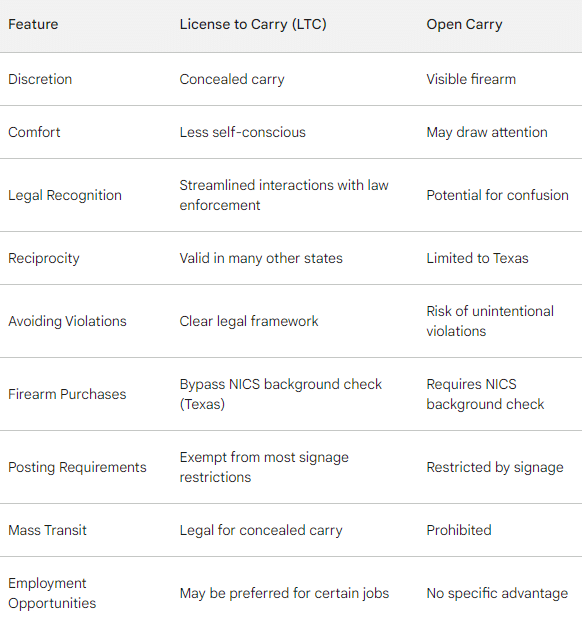
Ultimately, the decision between open carry and concealed carry with an LTC is a personal one. However, the advantages of an LTC offer a compelling option for many San Antonio residents seeking a more discreet, legally recognized, and convenient way to exercise their right to carry a concealed handgun.
Key Requirements for LTC Eligibility in San Antonio
Before applying for a License to Carry (LTC) in San Antonio, it’s crucial to understand the eligibility requirements. Here’s a breakdown of the key criteria you must meet:
- Age: You must be at least 21 years old to apply for an LTC in Texas. An exception exists for active-duty military personnel, who can qualify at 18 years old.
- Citizenship: You must be a U.S. citizen, or a permanent resident alien lawfully admitted for permanent residence in the United States.
- Residency: You must be a resident of Texas for at least six months or have relocated to the state with the intent to establish residency.
- Background Check: You must pass a comprehensive background check conducted by the Texas Department of Public Safety (DPS). This check will look for disqualifying factors such as felony convictions, certain misdemeanor offenses, and outstanding warrants.
- Mental Health: You cannot be currently adjudicated as mentally incompetent or committed to a mental institution.
- Training: You must successfully complete a Texas DPS-approved LTC training course. This course typically covers handgun safety, use of force laws, safe storage practices, and legal aspects of carrying a concealed handgun.
- Financial Requirements: You must pay the application fee and any associated fingerprint processing fees.
- Legal Compliance: You cannot be under indictment for a felony or Class A or B misdemeanor offense. You must also be current on any court-ordered child support obligations.
It’s important to note that these are the general requirements. Specific details and potential exceptions may exist, so it’s always recommended to consult the official Texas Department of Public Safety website for the most up-to-date information on LTC eligibility.
Here are some additional considerations regarding LTC eligibility:
- Military service: Active-duty military personnel stationed in Texas who are 18 years or older can apply for an LTC. Veterans with an honorable discharge may also qualify, depending on their discharge status.
- Out-of-state licenses: Texas does not recognize LTCs issued by other states for carrying concealed within the state. However, an LTC holder from another state may be able to carry concealed in Texas if their home state honors the Texas LTC through reciprocity agreements.
By understanding the eligibility requirements, you can determine if you qualify to obtain an LTC in San Antonio.
The Step-by-Step LTC Application Process in San Antonio
Obtaining a License to Carry (LTC) in San Antonio involves a streamlined process with several key steps. Here’s a detailed breakdown to guide you through the application journey:
1. Complete a Texas DPS-Approved LTC Training Course:
- This is the first and most crucial step. You must successfully complete a training course certified by the Texas Department of Public Safety (DPS). These courses typically last 4-6 hours and cover essential topics like:
- Handgun safety and operation (loading, unloading, malfunction clearing)
- Use of force laws and legal justifications for self-defense
- Safe gun storage practices (at home and while traveling)
- De-escalation techniques to avoid unnecessary firearm use
- Carrying and handling a concealed handgun (drawing from a holster, proper grip, etc.)
- Texas LTC laws and regulations
- Numerous qualified instructors offer LTC courses in San Antonio. Look for courses that meet the following criteria:
- DPS-approved curriculum: Ensure the course curriculum aligns with the latest DPS requirements. Reputable instructors will clearly state their DPS course approval on their website or marketing materials.
- Experienced and knowledgeable instructors: Choose instructors with a proven track record and expertise in firearms safety and concealed carry laws. Ideally, instructors should have extensive experience in firearms handling, legal matters, and de-escalation techniques. Many instructors will display their qualifications and experience on their websites or course descriptions.
- Positive student reviews: Research online reviews and testimonials from past students to gauge the quality of instruction, clarity of information, and overall course experience. Positive reviews can indicate a well-structured course with knowledgeable instructors.
- Course Content and Delivery: Look for courses that offer a comprehensive curriculum covering essential topics as mentioned above. Consider your learning style. Do you prefer a more lecture-based approach, or do you learn best through hands-on practice? Some courses may offer additional range time or live-fire exercises for an extra fee.
2. Fingerprint Submission:
- Electronic fingerprints are required as part of the LTC application process. Many LTC instructors offer fingerprint capture services during or after the training course. Alternatively, you can visit a DPS-approved fingerprint service provider. A list of approved providers can be found on the Texas DPS website here: https://www.dps.texas.gov/section/crime-records/fingerprinting-services
3. Application Submission:
- The LTC application can be submitted online via the Texas Department of Public Safety website or in person at a DPS regional office. Here’s the link to the online application portal: https://www.dps.texas.gov/section/handgun-licensing
- During the application process, you’ll need to provide the following:
- Completed LTC application form (available online or at DPS regional offices)
- Proof of successful completion of an LTC training course (certificate)
- Payment for the application fee and fingerprint processing fee (if not already paid to the instructor)
- Passport-sized photo (meeting specific requirements outlined on the DPS website)
4. Background Check:
- Upon application submission, the DPS will conduct a thorough background check to verify your eligibility. This check typically takes 30-60 days and may involve:
- Reviewing criminal history records
- Verifying residency and citizenship status
- Confirming mental health history
5. Permit Issuance:
- If you meet all eligibility requirements and pass the background check, the DPS will issue your LTC via mail. Expect to receive your permit within 60-90 days from the application date.
Important Note: This is a general overview of the LTC application process. Processing timelines and specific requirements may vary. It’s always advisable to refer to the official Texas DPS website for the most current information and any potential updates to the application procedures. Here’s the link again for easy reference: https://www.dps.texas.gov/section/handgun-licensing
Here are some additional tips to expedite the LTC application process:
- Gather all required documentation beforehand: Having all necessary documents readily available will streamline the application process.
- Submit a complete and accurate application: Double-check all information entered on the application form to avoid delays due to errors.
- Pay fees promptly: Ensure timely payment of application and fingerprint processing fees to avoid any hold-ups.
- Respond promptly to requests for information: If the DPS requires any additional information during the application process, respond promptly to avoid delays.
By following these steps and recommendations, you can navigate the LTC application process in San Antonio efficiently.
Selecting a Quality LTC Training Course in San Antonio
Choosing the right License to Carry (LTC) training course is a crucial step in obtaining your LTC in San Antonio. A well-designed course will equip you with the knowledge, skills, and legal understanding necessary for safe and responsible concealed carry. Here are some key factors to consider when selecting an LTC training course:
1. DPS-Approved Curriculum:
- This is the top priority. Ensure the course curriculum aligns with the latest Texas Department of Public Safety (DPS) requirements. Reputable instructors will clearly state their DPS course approval on their website or marketing materials. You can also verify course approval through the Texas DPS website here: [invalid URL removed]
2. Experienced and Knowledgeable Instructors:
- Look for instructors with a proven track record and expertise in firearms safety and concealed carry laws. Ideally, instructors should have extensive experience in firearms handling, legal matters, and de-escalation techniques. Many instructors will display their qualifications and experience on their websites or course descriptions. Here are some additional credentials to look for:
- National Rifle Association (NRA) Certified Instructor credentials
- Law enforcement or military background
- Experience as a firearms safety or self-defense instructor.
3. Positive Student Reviews:
- Research online reviews and testimonials from past students to gauge the quality of instruction, clarity of information, and overall course experience. Positive reviews can indicate a well-structured course with knowledgeable instructors. Look for reviews on platforms like Google Reviews, Yelp, or the instructor’s website.
4. Course Content and Delivery:
- Look for courses that offer a comprehensive curriculum covering essential topics like:
- Handgun safety and operation (loading, unloading, malfunction clearing)
- Use of force laws and legal justifications for self-defense in Texas
- Safe gun storage practices (at home and while traveling)
- De-escalation techniques to avoid unnecessary firearm use.
- Carrying and handling a concealed handgun (drawing from a holster, proper grip, etc.)
- Texas LTC laws and regulations
- Consider your learning style. Do you prefer a more lecture-based approach, or do you learn best through hands-on practice? Some courses may offer additional range time or live-fire exercises for an extra fee.
- Class size can also be a factor. Smaller class sizes often allow for more personalized instruction and interaction with the instructor.
5. Cost and Scheduling:
- LTC course fees can vary depending on instructor, class size, and any additional features offered (e.g., range time). In San Antonio, you can expect to pay anywhere from $75 to $200 for a basic LTC course. Consider comparing costs but prioritize quality instruction over the cheapest option.
- Choose a course schedule that fits your availability. Many instructors offer weekend or evening classes to accommodate busy schedules.
Here are some additional questions to consider when choosing an LTC training course:
- Does the course include a range qualification shooting test?
- Does the instructor offer continuing education courses for LTC holders?
- What type of firearm is used during the course instruction (if applicable)? Can you bring your own firearm?
- Does the course cover specific topics relevant to San Antonio, such as local gun laws or ordinances?
By following these tips and conducting your research, you can select a high-quality LTC training course in San Antonio that sets you up for success in obtaining your LTC and becoming a safe and responsible concealed carrier.
Associated Fees and Costs of a License to Carry in San Antonio
Obtaining a License to Carry (LTC) in San Antonio involves several fees associated with the application process and training requirements. Here’s a breakdown of the typical costs you can expect:
Mandatory Fees:
- LTC Application Fee: The Texas Department of Public Safety (DPS) charges a non-refundable application fee for processing your LTC request. This fee is currently $40.
- Fingerprint Processing Fee: Electronic fingerprint submissions are required for the LTC application. These fees are typically charged by the entity capturing your fingerprints (instructor or service provider). The cost can vary but generally falls within the range of $10 – $75. Some LTC instructors may include fingerprint processing in their overall course fee.
Course-Related Fees:
- LTC Training Course Fee: The cost of LTC training courses varies depending on the instructor, class size, and any additional features offered (e.g., range time). In San Antonio, you can expect to pay anywhere from $75 to $200 for a basic LTC course. Some instructors may offer additional services like live-fire range qualification for an extra fee.
Here’s a table summarizing the typical fees associated with obtaining an LTC in San Antonio:
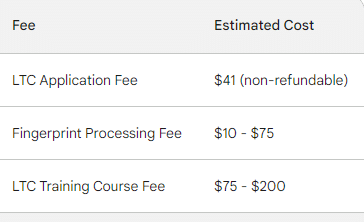
Total Estimated Cost: Depending on the instructor and any additional features chosen, the total cost of obtaining an LTC in San Antonio can range from approximately $126 to $276.
Additional Considerations:
- Renewal Fees: LTCs in Texas are valid for five years. Renewal applications typically involve a reduced fee compared to the initial application (currently around $39).
- Firearm and Ammunition Costs: While not directly related to the LTC application process, obtaining a handgun and ammunition for concealed carry will incur additional costs. The price of a handgun can vary significantly depending on the make, model, and caliber. Ammunition costs will also depend on the caliber chosen and how much practice you plan to do.
By planning for these fees, you can ensure a smooth and financially prepared journey towards obtaining your License to Carry in San Antonio. Here are some additional tips for saving on costs:
- Compare LTC course fees: Research course offerings from different instructors in San Antonio to find the best value for your budget.
- Consider online LTC courses: Some instructors offer online components to their LTC training, which may be a more affordable option compared to traditional classroom-based courses. However, online courses typically don’t include range qualification, which may require additional instruction or fees at a shooting range.
- Group discounts: Some instructors may offer discounts for enrolling in LTC courses with friends or family members.
Remember, prioritizing quality instruction over the cheapest option is essential for safe and responsible concealed carry.
Responsible Carry Practices with an LTC in San Antonio
A License to Carry (LTC) is a privilege that comes with significant responsibility. Carrying a concealed handgun requires a commitment to safety, awareness, and following the law. Here are some key points to remember for responsible carry practices in San Antonio:
1. Maintain Situational Awareness:
- Be constantly aware of your surroundings and potential threats. This includes paying attention to people’s behavior, identifying suspicious activity, and avoiding dimly lit or isolated areas.
- Develop a plan for responding to various situations. Consider how you would react to a potential threat and where you would seek cover if necessary.
2. Prioritize De-escalation:
- Whenever possible, prioritize de-escalation tactics to avoid using your firearm. This may involve using verbal commands, maintaining a safe distance, or disengaging from a volatile situation.
- Practice de-escalation techniques and verbal judo to diffuse tense situations peacefully. Consider enrolling in verbal de-escalation training courses specifically designed for concealed carriers.
3. Know When and Where You Can Carry:
- A allows concealed carry in most places throughout Texas, but there are exceptions. Always be familiar with specific restrictions in San Antonio, such as:
- Government buildings (courthouses, jails, etc.)
- Schools (including college campuses)
- Hospitals
- Polling places on Election Day
- Bars or establishments whose primary business is the sale of alcohol (unless they have a specific license)
- Respect private property signage. Businesses can prohibit concealed carry on their premises, even with an LTC, if they have proper signage posted.
- Always double-check local ordinances or with the establishment directly if you are unsure about concealed carry policies.
4. Secure Your Firearm:
- When not in use, always store your handgun securely in a locked safe or case. This prevents unauthorized access and accidental discharge. Follow safe storage practices even when at home, especially if you have children or other individuals in the household.
- Invest in a quality holster specifically designed for concealed carry. The holster should keep your firearm secure, readily accessible, and positioned for safe and comfortable draw.
5. Maintain Legal Knowledge:
- Stay informed about Texas laws regarding use of force and self-defense. An License to Carry in San Antonio course will cover these topics but consider taking refresher courses or consulting legal resources for ongoing knowledge.
- Understand the legal implications of drawing or using your firearm in a self-defense situation. Only use your firearm as a last resort when facing imminent threat of serious bodily injury or death.
6. Practice Regularly:
- Regular practice at a shooting range is crucial for maintaining proficiency and building confidence in your ability to handle a firearm safely and effectively.
- Practice drawing from your holster, firing accurately, and clearing malfunctions under pressure. Consider taking advanced handgun training courses to refine your skills and learn more defensive shooting techniques.
By following these responsible carry practices, LTC holders in San Antonio can contribute to a safer community and ensure they are prepared to exercise their right to concealed carry in a lawful and responsible manner.
Resources for Up-to-Date LTC Information in San Antonio
Obtaining and maintaining a License to Carry (LTC) in San Antonio requires staying informed about the latest regulations, legal updates, and safety best practices. Here are some valuable resources to keep you up-to-date:
- Texas Department of Public Safety (DPS) LTC Website: This is the official source for all information regarding LTCs in Texas. It provides details on eligibility requirements, the application process, training course requirements, FAQs, and legal updates related to LTC laws. Bookmark this website as a primary reference: https://www.dps.texas.gov/section/handgun-licensing
- Texas DPS LTC Online Portal: The DPS online portal allows you to submit your LTC application electronically, check the status of your application, manage your LTC renewal process, and access downloadable resources such as LTC law summaries and safety brochures. This is a convenient one-stop shop for managing your LTC throughout its lifecycle: https://txapps.texas.gov/txapp/txdps/ltc/
- National Rifle Association (NRA) – Eddie Eagle GunSafe® Program: This program, offered by the NRA, is a free gun safety education program for children. While not directly related to the LTC application process, it’s a valuable resource for parents and guardians to teach children firearm safety principles in the household. The program emphasizes the importance of “Stop! Don’t Touch. Leave the Area. Tell an Adult” when encountering a firearm. Learn more about the program and access free educational materials here: https://eddieeagle.nra.org/
- San Antonio Police Department (SAPD) Website: The San Antonio Police Department website may provide information on local firearm safety resources or any specific regulations regarding concealed carry within the city limits. It’s recommended to visit the SAPD website or contact them directly for any local inquiries on gun laws, safety practices, or range recommendations: https://www.sa.gov/Directory/Departments/SAPD
- Texas Legal Carry: This non-profit organization focuses on educating Texans about their right to carry a concealed handgun. They offer legal resources, CCW reciprocity information, and continuing education courses relevant to LTC holders. While not a substitute for legal advice, Texas Legal Carry can be a helpful resource for staying informed about legal developments and best practices for concealed carry: [invalid URL removed]
By utilizing these resources, you can ensure you have the most current information about LTC requirements, legalities of concealed carry in San Antonio, now known as License to Carry in San Antonio, and best practices for responsible gun ownership. Remember, gun safety is paramount, and continuous learning is essential for responsible LTC holders.
Conclusion
Obtaining a License to Carry in San Antonio empowers you to exercise your right to concealed carry with confidence and responsibility. This comprehensive guide has equipped you with the knowledge and resources necessary to navigate the LTC process, from understanding eligibility to choosing the right training course and practicing safe carry habits.
Key Takeaways:
- A License to Carry in San Antonio LTC offers advantages over open carry, including discretion, legal recognition, and reciprocity with other states.
- To qualify for a License to Carry in San Antonio, you must meet residency requirements, pass a background check, and complete a DPS-approved training course.
- The License to Carry in San Antonio application process involves submitting fingerprints, completing an application form, and paying associated fees.
- Choosing a qualified License to Carry in San Antonio instructor with a comprehensive curriculum is crucial for acquiring the necessary knowledge and skills for safe concealed carry.
- Responsible carry practices involve maintaining situational awareness, prioritizing de-escalation, understanding legal limitations, and practicing safe firearm storage and handling.
Next Steps:
- Review the Texas DPS LTC website: Familiarize yourself with the official requirements and application process.
- Research LTC training courses in San Antonio: Compare options based on curriculum, instructor qualifications, and your learning style.
- Choose a qualified LTC instructor and register for a course.
- Gather the necessary documentation for your application.
- Submit your LTC application online or in person at a DPS regional office.
- Practice regularly at a shooting range to maintain proficiency and safe handling of your firearm.
By following these steps and adhering to responsible carry practices, you can become a safe and informed LTC holder in San Antonio. Remember, gun safety is paramount, and continuous learning is essential for responsible gun ownership.
This guide serves as a starting point for your LTC journey in San Antonio. Feel empowered to explore the resources provided and delve deeper into topics that interest you. As laws and regulations can evolve, staying informed is key. With dedication to responsible carry, you can contribute to a safer San Antonio community.
Servicing San Antonio Zip Codes
78201, 78202, 78203, 78204, 78205, 78206, 78207, 78208, 78209, 78210, 78211, 78212, 78213, 78214, 78215, 78216, 78217, 78218, 78219, 78220, 78221, 78222, 78223, 78224, 78225, 78226, 78227, 78228, 78229, 78230, 78231, 78232, 78233, 78234, 78235, 78236, 78237, 78238, 78239, 78240, 78241, 78242, 78243, 78244, 78245, 78246, 78247, 78248, 78249, 78250, 78251, 78252, 78253, 78254, 78255, 78256, 78257, 78258, 78259, 78260, 78261, 78263, 78264, 78265, 78266, 78268, 78269, 78270, 78278, 78279, 78280, 78283, 78284, 78285, 78288, 78289, 78291, 78292, 78293, 78294, 78295, 78296, 78297, 78298, 78299

